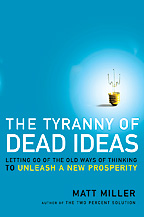The Tyranny of Dead Ideas: Letting Go of the Old Ways of Thinking to Unleash a New Prosperity by Matt Miller '83 (Times Books).

Miller, a Clinton administration economics adviser and Fortune magazine columnist, predicts that the United States is entering an age of dwindling resources—what he calls the "post–American dream era." Retiring baby boomers will put an unprecedented strain on the federal budget. Other nations will compete economically with the United States, inevitably siphoning off resources, jobs, and business. And globalization will subject U.S. workers to economic forces at work in countries around the world, potentially causing further unemployment and labor upheaval.
But don't despair. In The Tyranny of Dead Ideas: Letting Go of the Old Ways of Thinking to Unleash a New Prosperity, Miller offers compelling solutions: "Facing this head-on gives you the real kind of hope," he says. "There are ways to address all this stuff."
But instead of addressing the real issues, Miller says, politicians are spouting bromides and proffering shopworn solutions—the "dead ideas" of his book title—that can only lead the United States to catastrophe. "I want to wake people up to the direction we're headed," Miller says.
Miller worked in retail and as a management consultant for McKinsey before heading to Washington, D.C., to work for the federal government. He worked for the Office of Management and Budget until 1995, when he left the Clinton White House to pursue journalism and business consulting. He is now a senior fellow at the Center for American Progress, a Washington, D.C., think tank started by former Clinton Chief of Staff John Podesta.
For the last twelve years he has also hosted public radio's Left, Right, and Center, a political talk show produced at KCRW in Santa Monica, California. The show bills itself as a "civilized yet provocative antidote to the screaming talking heads that dominate political debate" and features political pundits unafraid of straying from their party's line. Only occasionally do they yell at one another.
Miller is a centrist who defies easy ideological labels. Siding with the left, he argues that the United States will have to raise taxes to cover the costs associated with baby boomers' retirements, and he calls for government to assume a far greater role in providing health care and education for all Americans. He rejects the right's mantra that taxes harm the economy as one of the dead ideas that must be jettisoned. "The 1950s and 1960s, the period of our fastest growth in productivity, was also the era of our highest marginal tax rates," Miller writes. "And if you compare national growth rates over the last three decades, you'll find that Austria, Finland, and Britain—all of which have higher taxes than the United States—grew faster."
But Miller also has no patience for liberals who strive to protect poor countries from the expanding reach of big business. Business lifts a nation, he argues, improving the quality of life and giving the poor access to opportunities and advancement they wouldn't have otherwise. "Business may ultimately be a more 'progressive' force than American labor or government in the decades ahead," Miller writes. He also calls for the United States to employ market-based solutions whenever possible to provide health care and education to the public. His voucher-based proposal for health care is closer to John McCain's approach than to Barack Obama's.
Miller's book hits stores at the start of what many are calling a new era in America politics. "There's a new spirit in the country to face our problems head on," Miller says. "I hope in some ways this can be the first book of the Obama era."
Lawrence Goodman is the BAM's senior writer.





